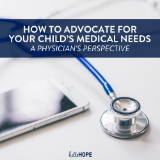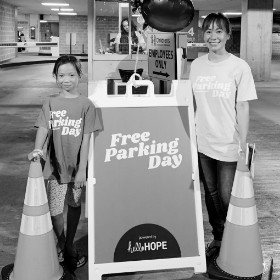How to Ask for Help When Challenges Come
Have you ever had a day when you felt like you weren’t receiving the love or support you needed? Like you didn’t know how you’d keep it together for the day? Maybe you’re staring at your refrigerator in utter exhaustion with no desire to cook or plan a meal, wondering how you’ll get the mental and physical energy to pull together dinner.
Or maybe the emotions are finally hitting from the tests and waiting over the last weeks. You’ve been the strong one for the last month, and you don’t want to show weakness to your family, but you need a chance to get some things off your chest.
Regardless, every family dealing with medical adversity experiences this at some point on their journey. When these days happen, community is one of our most powerful assets. The problem is that the people that most want to show their love to you can’t know how to best support and serve you without your help.
In a recent post, “The Power of Transparency,” I wrote about the encouragement and hope we can gain from candidly sharing with others about the victories and struggles along your journey. One benefit of bringing people with us as our story unfolds is the beautiful community that will develop around us to show us love, help, and encouragement when we need it most.
If we’ll open up to them.
Why it’s okay to ask for help
Asking for help can be a struggle for me. As a husband and dad, I want to offer the strength, provision, and support that Mary Beth and the girls need. I don’t want to let them down. In fact, there’s something about my identity that gets wrapped up in the ability to do it myself.
The only problem is, I can’t do it on my own.
I’m learning that I can’t fix everything, and just as importantly, I’m learning that God didn’t intend for me to be an island. In fact, I believe that our families are best loved, served, and supported when we show the humility and grace to ask for a helping hand from someone we trust.
One of the most beautiful examples of this is the way that John and Caroline Carroll accepted the love and support of their family, friends, and church as they faced the diagnosis of down syndrome and then leukemia with their daughter Claire. Their story will take your breath away. Their community walked with them every step of the way, and as a result, the Carroll’s were served in ways that far exceeded their expectations. Their hope was fed through the love and generosity of the people gathered around them.
You see, we were meant to live in –– to be surrounded by –– a loving community. But it’s up to us to take the step of opening up and growing in transparency, which means telling people when we need help.
How to ask for help
When it comes to asking for help, there isn’t a perfect formula or a “right way” to ask. With that said, I think there are some principles that can help you feel like you aren’t asking for handouts and give people a clear sense for what you need the most. Here are five things to keep in mind as you reach out for support:
Show humility. If you aren’t accustomed to asking for help, the experience in and of itself may be very humbling. Regardless, people that want to help are generally attracted to humility. One way to practically do this is share how you feel about asking for help and share about what you’re doing to meet your and your family’s emotional, physical, and spiritual needs.
Share your story. As you ask for help, your community will be able to pray and give more specifically if they know their story. You may also find common ground with people in your community that you never realized.
Be specific. While it can be uncomfortable to tell someone about a discouraging day that you need a listening ear and prayer for or an unexpected medical bill, we have to express the specifics of what we need.
Give options. Ask you think about ways that a community can show love and support for you and your family, don’t hesitate to give options. Maybe meals have been overwhelming to think about, you’ve been meaning to get to some nagging yard work, and you just need to know that specific needs are being prayed for. These options would give the ability for your community to serve you according to their strengths and abilities.
Say thank you. As you experience the powerful encouragement and love of a supportive community, remember to say thank you often. That is one way you can give back to your community and affirm their time and help.
Looking for ideas on how someone might be able to help out? Check out this post titled, “How to Help a Family Facing Medical Challenges” or this one titled, “5 Things to Send a Family Staying at a Hospital.”
Where to find community if you feel alone
If you’re facing medical adversity as a family, there are a few places you can turn to to find community and support. Even if you don’t have an established group of friends or family to turn to. Here are some places to consider:
Ask your doctor or nurses about communities or support groups. The medical community has a wealth of groups and resources that they can direct people to to help them cope with the emotional and practical challenges of a diagnosis. Don’t hesitate to ask about what’s available.
Check out a few local churches. If you don’t already have a local church or you’re out-of-town for medical treatment, there may be some churches that would be available to support you.
Ask local schools about resources and groups. If you have school-age children, your school or the local schools where you’re receiving treatment may be well-versed in additional support groups or communities that would be willing to help.
As you walk through your journey, know that there is community that wants to love and support you on both the good and the tough days. Know that there is a community that sees you for who you are, not the circumstances or diagnosis you face. And know that it’s okay to ask for help!













